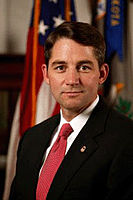North Dakota Republican Party | |
|---|---|
 | |
| Chairperson | Matthew Simon |
| Senate Leader | David Hogue |
| House Leader | Mike Lefor |
| Founded | 1889 |
| Headquarters | 1029 North Fifth St. Bismarck, ND 58501 |
| Ideology | Conservatism |
| National affiliation | Republican Party |
| Colors | Red |
| Seats in the U.S. Senate (N.D. seats) | 2 / 2 |
| Seats in the U.S. House (N.D. seats) | 1 / 1 |
| Seats in the North Dakota Senate | 42 / 47 |
| Seats in the North Dakota House of Representatives | 82 / 94 |
| Election symbol | |
 | |
| Website | |
| www.ndgop.org | |
The North Dakota Republican Party is the North Dakota affiliate of the United States Republican Party.
Contents
- History
- Notable figures
- Current elected officials
- Members of Congress
- Statewide offices
- Legislative
- Election results
- Presidential
- Gubernatorial
- See also
- References
- External links
Its platform is conservative. It is currently the dominant party in the state, controlling North Dakota's at-large U.S. House seat, both U.S. Senate seats and the governorship, and it has supermajorities in both houses of the state legislature.





